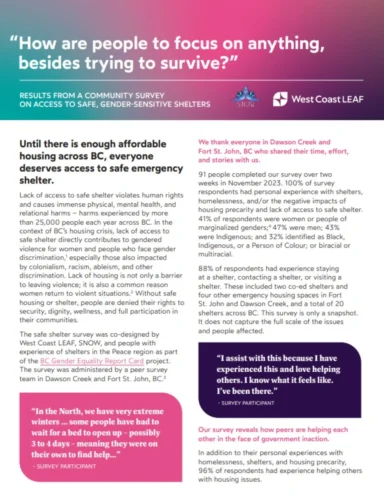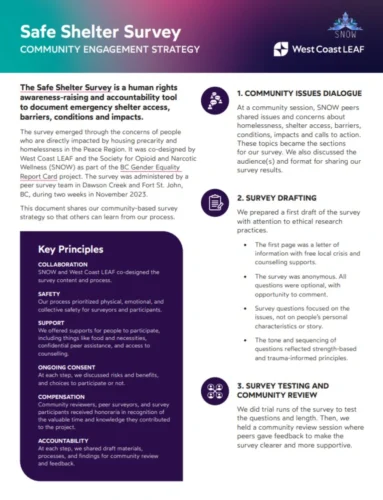
Safe shelter community survey
About the safe shelter survey
The Safe Shelter Survey is a human rights awareness-raising and accountability tool to document emergency shelter access, barriers, conditions, and the harmful impacts of not having access to safe shelter spaces. It was co-designed by West Coast LEAF and the Society for Narcotic and Opioid Wellness (SNOW) as part of the BC Gender Equality Report Card project.
The survey was administered by a peer survey team in Dawson Creek and Fort St. John, BC, over two weeks in November 2023. The 91 people who participated had direct experience with housing precarity and homelessness – including experience with 20 shelters across BC.
Thank you to everyone in Fort St. John and Dawson Creek who shared their time, effort, and stories to raise awareness about this crucial human rights issue.
What we learned: survey results
Lack of access to safe shelter violates human rights and causes immense physical, mental health, and relational harms. It directly contributes to gendered violence for women and people who face gender discrimination.
In Fort St. John and Dawson Creek, there are not enough safe shelter spaces – especially for people who face discrimination based on gender and other factors. Less than 15% of all respondents said there are usually enough shelter spaces for youth; people with pets; couples; women; Two-Spirit, trans, and non-binary people; survivors of violence; people with children; and seniors.
Across BC, there are widespread barriers to accessing shelters. Further, shelters typically fail to meet basic standards related to dignity, health, and safety. Survey respondents highlighted inadequate conditions regarding basic standards like privacy; safety; dignity; non-discrimination; and access to anti-violence, counselling, and overdose prevention supports. Women and people of marginalized genders more often faced situations where a bed was available, but it was not safe or did not meet their needs.
Our findings show how lack of access to safe shelter causes harms and puts people in danger. Among women and people of marginalized genders: 62% had stayed in an unwanted or bad relationship to keep housing; 27% had done survival sex work, or traded sex for housing; and 30% became separated from kids because of no safe shelter. Less commonly, these impacts were also faced by men.
Our survey also highlights how peers are helping each other in the face of government inaction. In addition to their personal experiences, 96% of respondents had experience helping others with housing issues.
Check out our detailed findings in the Results from the Safe Shelter Community Survey fact sheet and read the full Community Survey Engagement Strategy.
Envisioning a safe(r) future for all
Survey respondents shared clear calls to action for all three levels of government:
- Governments must fund pathways out of shelters into stable housing. Emergency shelters are urgently needed, but they are not a long-term solution to poverty and homelessness.
- Governments must address systemic, gendered, safety and human rights issues across BC’s emergency shelter system – including: ensuring shelter spaces are accessible, adequate, safe, and private; ensuring non-discrimination and cultural safety; ensuring access to trauma-informed and life-saving supports like mental health crisis intervention, grief counselling, anti-violence services, harm reduction, and overdose prevention; and ensuring shelter residents are fully involved in shelter design, decision-making, and operations.
SNOW is using survey findings to raise awareness, connect with allies, and push for access to safe shelter spaces in BC communities. SNOW and West Coast LEAF will also use survey findings to make a submission to a national human rights review panel on gendered homelessness.
Take action
- Call on governments to ensure everyone has access to safe, stable housing by building 25,000 new non-market homes per year in BC.
- Call on governments to urgently address systemic safety and human rights issues across BC’s emergency shelter system, by implementing the calls to action shared by survey respondents who have direct, expert knowledge of these issues.
- Speak out in your community to challenge stigma and protect the rights of people facing housing precarity and homelessness.
Emotional and legal support
West Coast LEAF is not a legal clinic. We do not offer legal advice, direct services, advocacy, or representation for individuals. For support services in BC, please see our Need Help page.
Contact the project team
For inquiries about the Safe Shelter Community Survey, please contact Kate Murray, law and policy researcher, at research@westcoastleaf.org.
Acknowledgements
This project has been supported in part by Women and Gender Equality Canada and the Health Sciences Association of BC. We are grateful for their support.



